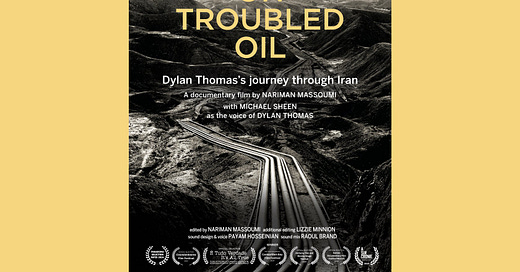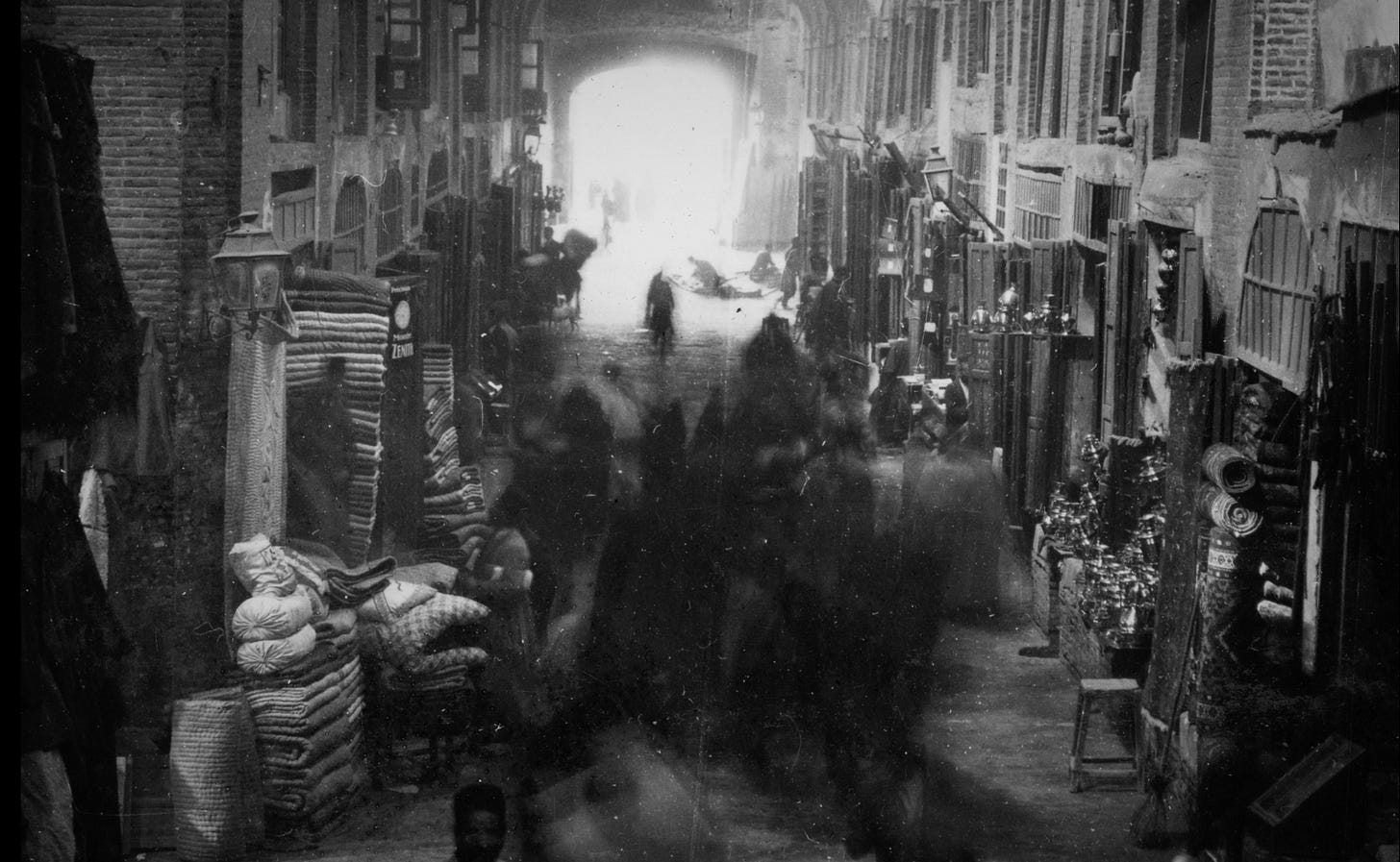Film Review: 'Pouring Water on Troubled Oil'
A documentary film by Nariman Massoumi on Welsh poet Dylan Thomas' journey through Iran in 1951
[Note: quotes from filmmaker Nariman Massoumi are drawn from the February 29, 2024 podcast The Cinematologists.]
It is 1951. The UK-based Anglo-Iranian Oil Company (later to become British Petroleum) has commissioned Welsh writer and poet Dylan Thomas to write a script for a publicity film about the company's presence in Abadan, Iran, the UK hub of their oil refining process.
What Dylan finds on his trip in February of that year is the basis for Nariman Massoumi’s short documentary Pouring Water on Troubled Oil. The heart of the film and indeed the process itself, is Massoumi marrying Dylan to the visual. In this aspect, he has assembled a stunning, often times, heartbreaking account that not only intensifies the intended purpose, but points to the reasons why its origin story failed to see the light of day.
Massoumi began the project during lockdown in 2020, but quickly assessed that the rendering needed more than a linear explanation. With access as a researcher to Thomas’ writings, he began to fill in the blanks to the rationale of all things, why an oil corporation would invest the time and energy into a figure such as Thomas. Indeed, the filmmaker was answering the questions Dylan could have obliquely asked himself: why was he chosen and why was he there?
Dylan’s lyrical prose and style were not unfamiliar as he had written for the screen, was a radio broadcaster, and knew something about putting pen to paper to elicit the right response. While he may have had conflicting emotions about the choice, more to the marrow inside, Massoumi humorously noted in the podcast, “He needed the money!”
The documentary is presented as proto-cinematic, brought to life by images from BP’s archives and a methodology akin to the look of French new wave. As Massoumi discussed, he wanted the feel to resemble the works of filmmakers Alain Resnais, Chris Marker, and Agnès Varda. Dylan was familiar with the work of Soviet director/screenwriter Sergei Eisenstein (Battleship Potemkin), and this is reflected as the material blends over several montage sequences.
As for Dylan’s writings, Massoumi was “struck by his lyrical, sardonic reflections” in bringing out the “colonial, dark, haunting underneath” his travels. He also opines as to whether Dylan encountered protests or oppositional voices: “I like to think he did.”
Integral to this adventure is the sound design, provided by several individuals. The music soundtrack, composed by Dariush Dolat-Shahi is described by Massoumi:
“I needed something that spoke to the magnitude of oil, and the clash between the industrial and the environmental” with a “mixture of modern and Persian-traditional."
Sound designer Payam Hosseinian provided not only a critical voiceover piece but supplied ambient sounds — wind, hyenas howling, and industrial machinery — to give as the director indicated, an “eerie, poetic, sometimes humorous, effect.”
The narration for the film is provided by Welsh actor Michael Sheen. This approach provides not only historical accuracy but allows Dylan’s voice to be given over to someone who has championed his work. “There’s a Welsh nationalism that Michael Sheen brings,” Massoumi explained. “It came to me immediately, but I knew he was very passionate about Dylan Thomas. I was trying to get him to not do an impression of Dylan Thomas, but speak to the personal and public address of the commentary, because it's a personal and intimate, inner piece of writing. And he’s a really amazing person to collaborate with. I was a bit nervous in directing him, but he was very open, very interested in the project.”
As for the original 1951 premise for the film, the filmmaker says succinctly, “It fell apart because of the turmoil in Tehran, importing equipment and so on.” However, Massoumi notes there are two more projects in the works, including a short piece “addressing letters between the film officer of the Anglo-Iranian oil company and the original director and the crisis over whether the film can be made.” He also has an interview with Ebrahim Golestan, an Iranian producer (who passed in 2023) who met Thomas at that time.
Pouring Water on Troubled Oil has been lauded in several film festivals, most notably as the 2024 Best Short Documentary winner at the Carmarthen Bay Film Festival in Wales. It’s in this context that Massoumi would like to create a dialogue and “bring academic research into the public sphere. I want it to be seen by an audience, particularly in Wales and the UK and to have conversations around it.”










Superb piece of research and drama that’s rich in cultural significance for the people of Wales and Iran. Please advise where can we view this film? Thanks
Marvelous new logo/e-mail header, Amy! If this isn't its debut, it's the first time I'm noticing! Really striking and very well done!